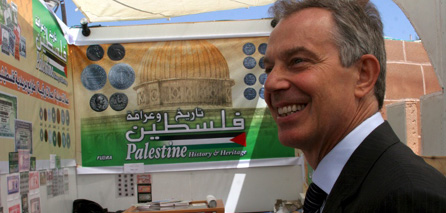PA questions Tony Blair’s role

When Tony Blair was appointed the Quartet’s Middle East envoy in 2007, he was tasked with encouraging donors to contribute to the Palestinian Authority, and with “help[ing] the Palestinians as they build the institutions and economy of a viable state.”
The Palestine Papers show that he’s done just that: Blair’s work in the West Bank and Gaza focused on state-building, rather than pushing the parties towards a solution on core issues. He worked with the Palestinians on sewage projects in the West Bank, and with the Israelis on relaxing movement restrictions on farm workers in the Jordan Valley.
At times – given the scope of the conflict – his projects seem quite small, an observation made at one point by Palestinian prime minister Salam Fayyad, who warned that Blair’s state-building efforts would amount to little without a more substantive change in Israeli policy.
“The weight of his office”
Blair’s earliest work includes a series of “quick impact projects” outlined in a November 2007 report. There is an agricultural park in Jericho; a sewage plant in northern Gaza; and a housing development project across the West Bank.
But The Palestine Papers suggest that many of Blair’s plans were unpopular with the Palestinians they were supposed to help. A December 2007 memo from the PA’s Negotiations Support Unit includes a number of complaints: His proposed agribusiness projects are dismissed, for example, because they require Palestinians to move back and forth – and to export goods – yet don’t demand that Israel implement the 2005 Agreement on Movement and Access.
The NSU would later expand on that concern in a preparatory memo for a meeting between Blair and Palestinian president Mahmoud Abbas.
“A key part of Tony Blair’s role should be to use the weight of his office to ensure Israel abides by existing agreements. It is not necessary for the envoy to engage in a creative process of devising new agreements and new access and movement arrangements. Israel must be persuaded to respect the AMA and Mr. Blair’s persuasive abilities precede his reputation. The Palestinian people are counting on Mr. Blair’s good offices to exert the necessary pressure.”
Another project, a series of industrial parks, would be handled by companies that received poor reviews from the NSU. One park would be run by a Turkish firm called TEPAV. “How will this help build Palestinian capacity, especially when we have Palestinian companies ready to engage?” the December 2007 memo asks.
A second company earmarked to work on the parks, The Northern Company, is dismissed as a joke. “They have been working on this since 1995. It is not a serious option. Blair’s team has not done their due diligence.”
The mayor of Bethlehem
After those initial “quick impact projects,” the scope of Blair’s work appears to diminish. In an April 2008 meeting, Blair and Palestinian prime minister Salam Fayyad discuss hotel occupancy rates; the following month, Blair updates Fayyad on a plan to allow 150 farm laborers to drive their cars to the Jordan Valley.
“Fayyad said these small things help, but only if they are a start for more easing of restrictions,” according to the minutes of their meeting.
The envoy devotes a growing amount of time in meetings to discussing the Palestinian security forces. In a March 2008 meeting with Fayyad, he urges the PA to deploy 1,000 men to Hebron:
Blair: I’m having a long meeting with Barak and am thinking of bringing [US national security adviser James] Jones with me. I understand that if battalion succeeds in Hebron then you can move to another area, but we need to negotiate with Israel to ensure we are all clear on where we are going. Nablus worked but Hebron needs a whole package.
(The Israelis would later reject this request, allowing the PA to deploy just 200 men instead of 1,000; the rejection became the lead subject in another meeting between Blair and Fayyad in October 2008.)
And Blair himself perhaps grew pessimistic that the Quartet’s economic projects would lead to meaningful change. The Palestine Papers include a February 2008 e-mail that contains “off-the-record quotes” from a meeting between Blair and a Russian diplomat. The subject of the e-mail notes that the quotes are not confirmed – but the language, if accurate, suggests Blair was increasingly pessimistic.
“Ultimately, the main focus is not on the economic front, as Blair thinks it would take 2 to 3 years to get anything major accomplished… Blair is mainly focusing on the political front. The lack of any progress since Annapolis is discouraging and will have bad consequences.”







